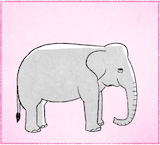
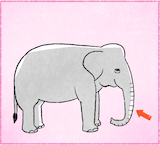
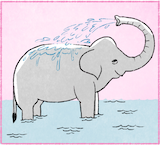
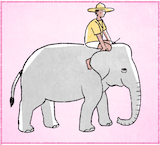
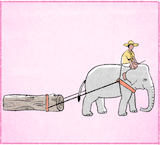
นี้คืออี่หยัง อันนี้คือซ้าง
ในโตของซ้าง อะวัยยะวะของซ้าง มันมีอี่หยังแน่ ซ้างมันกะสิมีหลายอย่าง
มีงวงพ้อม งวงมันสิญาวๆ งวงซ้างหนี้มันสิเป็นดังของซ้าง
แล้วกะมีงาพ้อม มีตาพ้อม มีหูพ้อม หูซ้างมันสิอันบักใหญ่หนึ่ง
แล้วกะมีตีนพ้อม ตีนซ้างสิมีสี่ตีน สองตีนสิอยู่ข้างหน้า สองตีนสิอยู่ข้างหลัง
แล้วกะมีหางพ้อม หางซ้างมันสิญาวบักคักหนึ่ง ญาวคักอี่หลี
ลำโตของซ้างหนี้ หลือว่าโตของซ้างหนี้ สิใหญ่คัก สิใหญ่คักอี่หลี ซ้างหนี้เป็นสัดที่ใหญ่ที่สุด หลือว่าโตใหญ่ที่สุดนั้นหละ
ซ้างมันใซ้ซีวิดอยู่ใส ซ้างมันอาสัยอยู่ใส ซ้างมันสิใซ้ซีวิดอยู่ในป่า ซ้างมันสิอยู่ในป่า มันหากินอยู่ในป่า มันกินพืดเป็นอาหาน มันบ่ได้กินเนี้ยสัดเป็นอาหาน
2
อันนี้คืออี่หยัง อันนี้เป็นอะวัยยะวะอี่หยังของซ้าง อันนี้เป็นงวงซ้าง อันนี้เป็นงวงของซ้าง หลือเป็นดังของซ้างนั้นหละ
งวงซ้างหนี้เอาไว้เฮ็ดหญัง งวงซ้างอันนี้เอาไว้ถ้าไปจับของ ใซ้แทนมือ ขั้นมันสิกินอี่หยัง หลือสิจับอี่หยัง มันสิเอางวงฮ่อนไปจับสิ่งนั้น หลือจับพืดที่สิมากิน หลือเอาไว้ถ้าหายใจ อันนี้เป็นดังของมันคือกัน เอาไว้ถ้าหายใจ
งวงซ้างหนี้มันสิญาวบ่ ญาวอยู่ ญาวบักคักหนึ่ง งวงซ้างมันญาวอี่หลี
3
ซ้างมันเฮ็ดอี่หยังอยู่ ซ้างมันเหล้นน้ำอยู่ มันกำลังเหล้นน้ำอยู่ในหนอง
ตอนนี้มันเหล้นอยู่ใส ตอนนี้มันเหล้นอยู่ในหนองน้ำ จักว่ามันเหล้นอยู่หนองใด จักว่ามันเหล้นอยู่หม้องใด ฮู้แต่ว่ามันเหล้นอยู่ในหนองน้ำ เหล้นอยู่โตเดียวข้อหล้อ
แล้วซ้างมันเหล้นน้ำเฮ็ดหญัง มันอาดสิฮ้อน มันกะเลยมาเหล้นน้ำอยู่ในหนองกะได้
แล้วซ้างทุกโตมันสิมักเหล้นน้ำ เพาะว่าซ้างมันสิมักเหล้นน้ำหลาย มันสิมักอยู่ในน้ำ
ขั้นมันอยู่ในน้ำแล้ว มันสิเฮ็ดให้เย็น เฮ็ดให้โตมันเย็นขึ้น หลือเฮ็ดให้ล้างกายมันเย็นขึ้นนั้นหละ
ตอนนี้ซ้างมันมีอาลมจั่งใด มันคือสิมีความสุขหลาย ที่มันได้เหล้นน้ำ มันกะสิเย็นขึ้น ล้างกายมันกะสิสดซื้นขึ้น
4
เขากำลังเฮ็ดอี่หยัง เขากำลังนั่งอยู่เทิงหัวซ้าง
จักว่าเขาเฮ็ดอี่หยัง จักว่าเขาสิเฮ็ดอี่หยังกับซ้าง อันนี้เฮากะบ่ฮู้คือกัน เห็นแต่ว่าเขากำลังนั่งอยู่เทิงซ้าง นั่งอยู่เทิงหัวซ้าง
เขานั่งอยู่เทิงหัวซ้างนี้ เขาเอิ้นว่าอาซีบอี่หยัง มันเป็นอาซีบอี่หยัง อันนี้กะบ่ฮู้คือกัน จักว่าเขากำลังเฮ็ดอี่หยังอยู่ แล้วแต่คน แล้วแต่คนสิเอาซ้างไปหากินในลูบแบบใด บางคนกะเอาซ้างไปใซ้งาน บางคนกะเอาซ้างไปไว้ถ้าโซ โซกานสะแดง หลือเฮ็ดในลูบแบบต่างๆ แล้วแต่คนสิเอาไปเฮ็ดสิเอาไปทำ
อุปะกอนที่เขาใซ้อยู่หั้น อุปะกอนแหลมๆ ที่เขาจับอยู่หนั้น หลือถืออยู่หั้น เขาเอิ้นว่าอี่หยัง มันเป็นอี่หยัง เขาเอิ้นว่าตะขอ เป็นตะขอเกาะซ้าง หลือเอาไว้ถ้าบังคับซ้าง หลือเอิ้นอีกอย่างหนึ่งว่า ขอซ้าง หลือขอบิ่น แต่ส่วนมากแล้ว เขาสิเอิ้นว่าตะขอ มันสิเอิ้นง่ายกว่ากัน หลือมันจำง่ายกว่ากันนั้นหละ
5
เกิดอี่หยังขึ้น ซ้างมันกำลังลากขอนไม้
ตอนนี้มีคนกำลังบังคับซ้างอยู่ เขานั่งอยู่เทิงหัวซ้าง เขากำลังใซ้ซ้างลากขอนไม้นี้ ลากขอนไม้บักใหญ่หนึ่ง
แล้วซ้างมันหนักบ่ กะอาดสิหนักอยู่ เพาะว่าขอนไม้ที่มันลากนี้อันบักใหญ่ อันใหญ่บักคัก
แล้วซ้างโตนี้ ลากขอนไม้นี้มาแต่ใส ลากมาแต่ไกบ่ จักคือกัน อาดสิลากมาแต่ในป่า อาดสิลากมาแต่ในดง กะอาดสิลากมาแต่ไกกะได้
Link to overview page
Link to dictionary
| Isaan | Pronunciation | Tones | Thai | English/Notes |
|---|---|---|---|---|
| นี้ | ni: | HF | นี้ | 1. this 2. here |
| คือ | khʉ: | HR | คือ | 1. to be, to resemble, like, as 2. why {บักหล้าคือบ่เก็บโต่ะแน่ = [addressing a young boy] Why haven't you cleared the table?} |
| อี่หยัง | i:-yaŋ | H-M | อะไร | 1. what {นี้คืออี่หยัง = What is this?} {มื้อนี้เจ้าเฮ็ดอี่หยัง = What are you doing today?} {กินเข้างายกับอี่หยัง = What did you have for breakfast?} 2. something, anything, (in negations) nothing {บ่ต้องเฮ็ดอี่หยังอีกเลยนอกจากใส่ปุย = [we] don't need to do anything besides adding fertilizer} |
| อัน | an | M | อัน | 1. thing, object 2. general clf. for objects |
| ซ้าง | sa:ŋ | HF | ช้าง | elephant |
| ใน | nai | HR | ใน | in, within |
| โต | to: | M | ตัว | 1. body, self 2. clf. for animals, characters/letters/consonants, appliances, clothes (e.g., pairs of trousers, shirts) |
| ของ | khɔ:ŋ | M | ของ | of, belonging to |
| อะวัยยะวะ | a-wai-ya-wa | M-HR-M-H | อวัยวะ | organ, body part |
| มัน | man | HR | มัน | it (also used to refer to people) |
| มี | mi: | HR | มี | 1. to have 2. there is |
| แน่ | nɛ: | H | แน่, บ้าง | 1. some, somewhat 2. final particle, used to ask for examples (similar to Thai บ้าง at the end of a question) {หม้อใซ้เฮ็ดอี่หยังได้แน่ = What (different things) can a pot be used for?} {น้ำอัดลมซื้อได้อยู่ใสแน่ = Where/in which places can one buy soft drinks?} 3. final particle, when giving examples {มีเทิงส้งแน่ มีเสี้ยแน่ มีเกิบแน่ = there are trousers, shirts, shoes etc.} 4. final particle, used to give a command {ไปปิดหน้าต่างให้แน่ = Close the window!} 5. final particle, acting as an intensifier, especially in the pattern ... คัก ... แน่ {สูงคักสูงแน่ = very high} {ญ้องเฮาคัก ญ้องเฮาแน่ = [he's] praising me a lot} |
| กะ | ga | M | ก็ | 1. then, consequently 2. also |
| สิ | si | M | จะ | future tense auxiliary {เขากำลังสิตื่น = he's about to wake up} {สิไปตะหลาด = [I'm] going to the market} |
| หลาย | la:i | M | เยอะ, มาก | many, much, very |
| อย่าง | ya:ŋ | H | อย่าง | type, kind, sort, category |
| งวง | ŋu:aŋ | HR | งวง | trunk of an elephant |
| พ้อม | phɔ:m | HF | พร้อม | at the same time, also, too {มีตะเว็นพ้อม = the sun's out, too} {กะทะมีด้ามพ้อม = the pan has also a handle} |
| ญาว | ɲa:o | HR | ยาว | long |
| หนี้ | ni: | LF | นี่ | here |
| เป็น | pen | M | เป็น | 1. to be, to exist 2. to be able to 3. to suffer, sth. happens to 4. เป็นหญัง[...]คือ in initial position: why? {เป็นหญังเขากะคือแปงฟัน = Why is he brushing his teeth?} {เป็นหญังเคี่ยงบินมันคือสิตก = Why is the airplane falling down?} |
| ดัง | daŋ | M | จมูก | nose |
| แล้ว | lɛ:o | HF | แล้ว | 1. finished 2. already 3. and then, and next (especially แล้วกะ) 4. auxiliary for past tense |
| งา | ŋa: | HR | งา | tusk, ivory |
| ตา | ta: | M | ตา | eye {เขามีตาสองข้าง = he's got two eyes} {หลับตา = to close one's eyes} |
| หู | hu: | M | หู | 1. ear 2. opening, hole, e.g., the hole a needle has to insert the thread 3. handle which has a hole, e.g., of a cup or pot |
| บัก | bak | M | 1. intensifier before adjectives {ปาโตบักใหญ่ = a (very) large fish} 2. prefix in front of fruits and vegetables {บักแตงโม = watermelon} 3. can be used as a reference for a male person of the same or younger age {บักอันนี้ = this lad} |
|
| ใหญ่ | ɲai | H | ใหญ่ | large, big |
| หนึ่ง | nʉŋ | H | หนึ่ง | 1. one 2. after adjective: intensifier {บักคักหนึ่ง = very much} {อันบักใหญ่หนึ่ง = very large}, or attenuates the meaning {กะดาดมันแผ่นน้อยๆ หนึ่ง = the piece of paper is [relatively] small} |
| ตีน | ti:n | M | ตีน | foot |
| สี่ | si: | H | สี่ | four |
| สอง | sɔ:ŋ | M | สอง | two |
| อยู่ | yu: | H | อยู่ | 1. to be (located) at 2. yet, still 3. auxiliary indicating continuous or progressive action {ทอดปาอยู่ในกะทะ = (in the process of) frying a fish in the pan} {แม่กำลังเมี้ยนเฮียนอยู่ = mother is cleaning/tidying up the house} |
| ข้างหน้า | kha:ŋ-na: | LF-LF | ข้างหน้า | in front, forward |
| ข้างหลัง | kha:ŋ-laŋ | LF-M | ข้างหลัง | behind, in the back of |
| หาง | ha:ŋ | M | หาง | tail |
| บักคักหนึ่ง | bak-khak-nʉŋ | M-H-H | intensifier: very, very much (variant of คัก) | |
| คัก | khak | H | intensifier: very, very much | |
| อี่หลี | i:-li: | H-M | จริง | intensifier: really Notes: pronunciation: also realized as อี่หลิ |
| ลำโต | lam-to: | HR-M | ลำตัว | body |
| หลือ | lʉ: | M | หรือ | or |
| ว่า | wa: | H | ว่า | 1. that, as {คำว่า X = the word X} 2. to say |
| สัด | sat | M | สัตว์ | animal |
| ที่ | thi: | H | ที่ | 1. that, which {คนที่ยืนอยู่ฝั่งขวา = the person which is standing on the right = the person standing on the right} {เว้าคำที่บ่สุพาบ = to speak words which are impolite = to speak impolitely} 2. for ordinal numbers {ที่สาม = third} |
| ที่สุด | thi:-sut | H-M | ที่สุด | most |
| นั้นหละ | nan-la | HF-M | นั่นแหละ | auxiliary for emphasis at the end of a phrase |
| ใซ้ซีวิด | sai-si:-wit | HF-HR-H | ใช้ชีวิต | to live, to spend one's life |
| ใส | sai | M | (ที่)ไหน | 1. where? {สิไปใส = Where are [you] going?} {มาแต่ใส = Where are [you] coming from?} {กะทะอยู่ใส = Where's the pan?} 2. somewhere, anywhere {ใสกะได้ = anywhere, wherever you like} |
| อาสัย | a:-sai | M-M | อาศัย | 1. to live, to reside, to settle {ซ้างมันอาสัยอยู่ใส = Where do elephants live?} 2. to use |
| ป่า | pa: | H | ป่า | forest |
| หา | ha: | M | หา | to look for, to find |
| กิน | gin | M | กิน | to eat, to consume, to use |
| พืด | phʉ:t | HF | พืด | plant |
| อาหาน | a:-ha:n | M-M | อาหาร | food {ญุงมันกินเลียดเป็นอาหาน = the mosquito feeds on blood} |
| บ่ | bɔ: | H | ไม่ | 1. no, not 2. question particle, transforming a statement into a question Notes: spelling exception in line with common usage on social media |
| ได้ | dai | HF | ได้ | 1. can 2. to get, to obtain 3. before verb: indicating past tense 4. บ่ได้ + verb: not |
| เนี้ย | ni:a | HF | เนื้อ | meat Notes: pronunciation: also realized as เนื้อ |
| เอา | ao | M | เอา | to take, to give {เขากำลังเอาก่องไปซั่ง = he's taking the boxes to weigh them} {หมอกำลังเอายาให้คนป่วยกิน = the doctor is giving medicine to the patient} {เอาไว้ถ้า = is for, is used for, has the purpose of} |
| ไว้ | wai | HF | ไว้ | 1. to keep, to put, to place, to retain, to save, to reserve {เขาเอาหัวของเขาไว้ใส = Where does she put her head?} {หมาสิเลี้ยงไว้บ้าน = dogs are kept/raised in the house} {ไก่เลี้ยงไว้ในคอก = chicken are kept/raised in a coop} {หน้ามันบังไว้ = the face is covered/not visible} {เขาเอาโทละสับวางไว้หู = he holds the phone to his ear} 2. for {นาลิกาปุกมีไว้เฮ็ดหญัง = What is an alarm clock for?} {หม้อเอาไว้เฮ็ดแนวกิน = a pot is used to make food} {ก่องเอาไว้เฮ็ดหญัง ก่องเอาไว้ใส่ของ = What is the box for? It's for putting in stuff.} Notes: see also ไว้ถ้า |
| เฮ็ด | het | H | ทำ | to do, to make |
| หญัง | ɲaŋ | M | อะไร, เป็นหญัง = ทำไม | 1. what {เขากำลังเฮ็ดหญัง = What is he doing?} {ธูปเอาไว้เฮ็ดหญัง = What are incense sticks for?} 2. something, anything, (nothing) 3. เป็นหญัง[...]คือ in initial position: why {เป็นหญังเขาคือใส่บักพิกลงไปในกวยเตียว = Why is he putting chili in [his] noodle soup?} {เป็นหญังหน้าต่างมันคือเปิด = Why is the window open?} {เป็นหญังมันคือมีควนไฟ = Why is there smoke?} |
| ไว้ถ้า | wai-tha: | HF-LF | usually in a positive statement or answer: is for, is used for, has the purpose of {กะทะมีไว้ถ้าทอด = a pan is for frying} {น้ำบักนาวมีไว้ถ้าปุงอาหาน = lime juice is used to season food} {ปากกามีไว้ถ้าเขียน = a pen is for writing} {กะเทียมเอาไว้ถ้าเฮ็ดแนวกิน = garlic is used to make food} {ขาเอาไว้ถ้าญ่าง = legs are for walking} {เกิบเอาไว้ถ้าใส่ = shoes are for wearing} Notes: see also ไว้ |
|
| ไป | pai | M | ไป | 1. to go 2. auxiliary indicating action extending into the future |
| จับ | jap | M | จับ | 1. to grasp, to hold {เขาจับมือกัน = they're holding hands} {เขายืนจับไอติมอยู่ = she's standing, holding an ice cream} 2. to catch, to arrest {จับพุล้าย = to arrest a criminal} |
| ใซ้ | sai | HF | ใช้ | to use |
| แทน | thɛ:n | HR | แทน | 1. to replace 2. instead of |
| มือ | mʉ: | HR | มือ | 1. hand 2. front leg/paw (e.g., of a cat) |
| ขั้น | khan | LF | เมื่อ | when, if |
| ฮ่อน | hɔn | H | ร่อน | to hover (over) |
| สิ่ง | siŋ | H | สิ่ง | thing, object |
| นั้น | nan | HF | นั้น | that, there |
| มา | ma: | HR | มา | 1. to come 2. auxiliary expressing action towards the present or focal time {กะคุเฮ็ดมาจากอี่หยัง = What is the bucket made of?} {แล้วเขากะเก็บเงินจากพุนั้นมา = and then she takes the money of that person} |
| หายใจ | ha:i-jai | M-M | หายใจ | to breathe |
| คือกัน | khʉ:-gan | HR-M | เหมือนกัน | 1. also, likewise, similarly {ยินดีที่ได้ฮู้จักคือกันคับ = Nice to meet you too!} 2. in negative sentences: either {บ่ลู้คือกัน = I don't know either} {จักคือกัน = I don't know (either)} |
| เหล้น | len | LF | เล่น | 1. to play, to enjoy oneself with, to do something for pleasure {เหล้นลูกบอน = to play ball} {เหล้นเกม = to play a game/games} {เหล้นน้ำ = to play with/in the water} {นั่งเหล้น = to sit} {กินเหล้น = to eat (as a snack), to snack} {เหล้นโน่ดบุ่ก = to use a laptop (for entertainment or work)} 2. to drop by, to spend time with, to come to visit {บ่ได้มาเฮ็ดหญัง มาเหล้นซื่อๆ = I've not come to do anything in particular, I'm just dropping by} |
| น้ำ | na:m | HF | น้ำ | 1. water 2. drink, soft drink, juice |
| กำลัง | gam-laŋ | M-HR | กำลัง | auxiliary indicating continuous or progressive action |
| หนอง | nɔ:ŋ | M | หนอง | lake, pond, swamp |
| ตอนนี้ | tɔ:n-ni: | M-HF | ตอนนี้ | now |
| จัก | jak | M | จัก | 1. answer to a question: [I] don't know, don't know exactly, [I'm] not sure {พุซายคนนี้เขาเถ้าไป่ จัก จักเถ้าหลือบ่เถ้า เบิ่งบ่ค่อยออก = Is this man here already old? I don't know. I can't see clearly whether he's old or not.} {เขาเว้ากันอยู่ใส จักคือกัน = Where are they talking? I don't know either.} 2. exact(ly), what exactly {จักต้มอี่หยังกะบ่ฮู้ = I don't know what (exactly) he is cooking} {บ่ลู้คือกันจักปาอี่หยัง = I don't know either what kind of fish this is} 3. how much/many? {ต้นไม้มีจักต้น = How many trees are there?} {ตอนนี้จักโมงแล้ว = What time is it now?} {มือของเฮานี้สิมีจักนิ้ว = How many fingers do our hands have?} 4. a bit, a little bit {จักหน่อย/จักหน่อยหนึ่ง = a bit, a little bit} |
| ใด | dai | M | ใด | 1. which, that one which, what, how {เขานั่งแบบใด เขานั่งขดตะหมาดอยู่ = How is he sitting? He's sitting cross-legged.} {ตอนใด = when?} 2. whichever, whoever {หม้องใดหม้องหนึ่ง = some place, somewhere} {ขั้นเฮาอยากตื่นญามใด เฮากะตั้งเวลาปุกญามนั้น = If we want to get up at a certain time, we set the alarm to that time} Notes: sentence-final often with a marked rising tone |
| หม้อง | mɔŋ | LF | ที่, แห่ง, บริเวณ | 1. place, area {หลายที่หลายหม้อง = in many places} {หม้องใดหม้องหนึ่ง = some place} 2. clf. for places |
| ฮู้ | hu: | HF | รู้ | 1. to know 2. to understand Notes: equivalent to ลู้ |
| แต่ว่า | tɛ:-wa: | H-H | แต่ว่า | 1. but 2. only {ฮู้แต่ว่าเขายืนอยู่พุเดียว = I only know that he's standing there by himself} |
| เดียว | di:ao | M | เดียว | only, alone, single |
| ข้อหล้อ | khɔ:-lɔ: | LF-LF | เท่านั้น, ขนาดนั้น, น้อยๆ | only {ต้นไม้มีต้นเดียว ต้นเดียวข้อหล้อ = there's one tree, only one tree} {มีบ้านหลังเดียวข้อหล้อ = there's only one house} |
| อาด | a:t | LF | อาจ | 1. might, may, will 2. likely |
| ฮ้อน | hɔ:n | HF | ร้อน | hot |
| เลย | lə:i | HR | เลย | 1. futher on, beyond, past {เข็มน้อยเลยเลขสิบสองไป = the minute hand has passed number twelve} 2. too much 3. at all 4. definitively 5. completely, utterly |
| ทุก | thuk | H | ทุก | every Notes: also pronounced ทุ as in ทุมื้อๆ = everyday, always |
| มัก | mak | H | ชอบ | to like, to love, to want, to desire |
| เพาะว่า | phɔ-wa: | H-H | เพราะว่า | because |
| ให้ | hai | LF | ให้ | 1. to give {หมอกำลังเอายาให้คนป่วยกิน = the doctor is giving the patient medicine} 2. for 3. to allow, to be allowed |
| เย็น | yen | M | เย็น | cold, cool (air, objects) |
| ขึ้น | khʉn | LF | ขึ้น | 1. to go up, to increase 2. sun: to rise {ตะเว็นกำลังขึ้น = the sun is rising} 3. more 4. bus/train etc.: to get on, to board {พุโดยสานขึ้นลดไฟเบิดแล้ว = all passengers have boarded the train} |
| ล้างกาย | la:ŋ-ga:i | HF-M | ร่างกาย | body |
| อาลม | a:-lom | M-HR | อารมณ์ | temper, feeling, mood, emotion |
| จั่งใด | jaŋ-dai | H-M | ยังไง, แบบไหน | how, in what manner {บักนาวมันมีลดซาดจั่งใด = Lime fruits have what kind of taste?} {เขาปิดแอจั่งใด = How is he switching off the A/C?} {เทียนใซ้จั่งใด = How's a candle used?} {สิใซ้จั่งใด = how is [it] used?} |
| ความสุข | khwa:m-suk | HR-M | ความสุข | happiness |
| สดซื้น | sot-sʉ:n | M-HF | สดชื่น | fresh, refreshed Notes: pronunciation: also realized as สดชื้น |
| เขา | khao | M | เขา | personal pronoun: he, she |
| นั่ง | naŋ | H | นั่ง | to sit |
| เทิง | thə:ŋ | HR | บน | 1. on, on top of, at, in {เทิงโต่ะ = at/on the table} {กบมันนั่งอยู่เทิงใบบัว = the frog is sitting on the lotus leaf} {เทิงท้องฟ้า = in the sky} {มันแล่นอยู่เทิงลาง = [the train] runs on rails} {มีคนนั่งอยู่เทิงลดสามล้อสามคน = there are three people sitting in the tuk tuk} 2. up, upward Notes: pronunciation: also realized as ทัง |
| หัว | hu:a | M | หัว | 1. head 2. clf. for onions, bulbs of garlic |
| กับ | gap | M | กับ | 1. and {ลุงกับป้า = uncle and aunt} {กวยเตียวหมูกับกวยเตียวไก่ = noodle soup with pork and noodle soup with chicken} 2. with, to {ค้ายๆ กับคำว่า ... = similar to the word ...} 3. prefix in front of foods {กับเข้า = side dishes eaten with rice} {เขากินกับกวยเตียว = he's eating noodle soup} |
| เฮา | hao | HR | เรา | 1. personal pronoun: we 2. personal pronoun: I |
| เห็น | hen | M | เห็น | to see |
| เอิ้น | ə:n | HF | พูด, เรียก | to call, to say {เอิ้นง่ายๆ ว่า = in other words} {คนอี่สานเอิ้นว่า เป็นลูกคนกก = Isaan people call her ลูกคนกก} |
| อาซีบ | a:-si:p | M-HF | อาชีพ | profession, occupation Notes: pronunciation: also realized as อาชีพ |
| แล้วแต่ | lɛ:o-tɛ: | HF-H | แล้วแต่ | up to, depending on |
| คน | khon | HR | คน | person, people |
| ลูบแบบ | lu:p-bɛ:p | HF-LF | รูปแบบ | format, style, form, pattern, type |
| บาง | ba:ŋ | M | บาง | 1. some {สัดบางโตบ่มีขา = some animals don't have legs} {บางคนสิมักกินกวยเตียวแทนเข้า = some people like to eat noodle soup instead of rice (dishes)} {บางสิ่งบางอย่าง = something, anything} 2. thin |
| ใซ้งาน | sai-ŋa:n | HF-HR | ใช้งาน | to use, to put to use |
| โซ | so: | HR | โชว์ | show Notes: pronunciation: also realized as โช |
| กาน | ga:n | M | การ | prefix indicating the action of ... |
| สะแดง | sa-dɛ:ŋ | M-M | แสดง | show, play, perform |
| ต่างๆ | ta:ŋ-ta:ŋ | H-H | ต่างๆ | different, various |
| ทำ | tham | HR | ทำ | to do |
| อุปะกอน | u-pa-gɔ:n | M-M-M | อุปกรณ์ | tool |
| หั้น | han | LF | ที่นั่น | there, over there |
| แหลม | lɛ:m | M | แหลม | sharp |
| หนั้น | nan | LF | นั้น | that, there Notes: possibly a variant of นั้น or หั้น |
| ถือ | thʉ: | M | ถือ | 1. to hold 2. to carry 3. to regard as, to consider {สี่สิบองสาถือว่าฮ้อน = 40 degrees Celsius is considered hot} |
| ตะขอ | ta-khɔ: | M-M | ตะขอ | hook |
| เกาะ | gɔ | M | เกาะ | 1. island 2. to stick to, to cling, to hold 3. elephant: to direct |
| บังคับ | baŋ-khap | M-H | บังคับ | to force, to direct, to control |
| อีก | i:k | LF | อีก | 1. more, again 2. other, another |
| ขอซ้าง | khɔ:-sa:ŋ | M-HF | ขอช้าง | elephant hook |
| ขอบิ่น | khɔ:-bin | M-H | ขอช้าง | elephant hook |
| แต่ | tɛ: | H | แต่ | 1. but {แต่บ่ต่างกันหลาย = but not very different} {แต่บ่ลู้ว่าเขาญ่างมาแต่ใส = but [I] don't know where he's coming from, see also: แต่ว่า} 2. only {ตอนนี้มีแต่ขี้ฝ้า = now there are only clouds} |
| ส่วนมาก | su:an-ma:k | H-HF | ส่วนมาก | mostly, usually, generally |
| ง่าย | ŋa:i | H | ง่าย | easy, simple, clear |
| กว่า | gwa: | H | กว่า | more, more than, comparative: as, than |
| กัน | gan | M | กัน | mutual, each other, with another, together {เขากำลังนั่งเว้ากัน = they're sitting and talking} {เขาสองคนฮักกัน = they love each other} {ปาสองโตนี้ ใหญ่ห่างกันหลายบ่ = These two fish here, are they very different in size (from each other)?} {ต่างกัน = to be different (from each other)} {ก่องอันไหนหนักกว่ากัน = Which box is heavier (than the other(s))?} |
| จำ | jam | M | จำ | 1. to remember, to memorize 2. to observe the Buddhist precepts {จำสีน = to observe the Buddhist precepts} |
| เกิด | gə:t | LF | เกิด | 1. (often together with ขึ้น) to happen, to arise, to take place {เกิดอี่หยังขึ้น = what is happening?} {บ่มีหญังเกิดขึ้น = nothing's happening} 2. to be born 3. to grow {หนวดกะคือสิเกิดอยู่ใต้ดัง = a moustache grows below the nose} |
| ลาก | la:k | HF | ลาก | to drag, to tow |
| ขอนไม้ | khɔ:n-mai | M-HF | ขอนไม้ | log |
| หนัก | nak | M | หนัก | heavy |
| บักคัก | bak-khak | M-H | intensifier: very, very much (variant of คัก) | |
| แต่ใส | tɛ:-sai | H-M | จากไหน | where from? |
| แต่ | tɛ: | H | จาก | 1. from {มาแต่โลงเลียน = [I'm] coming from the school} {เห็นเขาญ่างมาแต่ทางหลัง = seeing him coming from behind, see also: แต่ใส} 2. since, ago {แต่โดนเติบ = long ago} |
| ไก | gai | M | ไกล | far, distant |
| ดง | doŋ | M | ดง | jungle, dense forest |